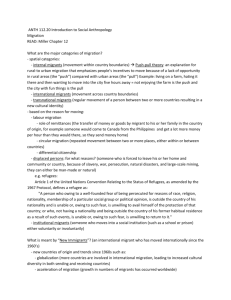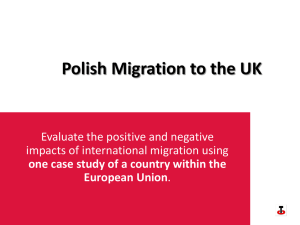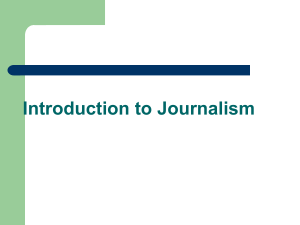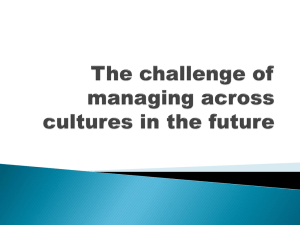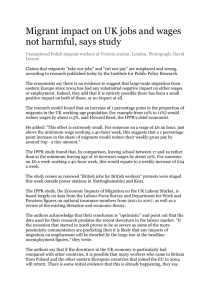Migration: Global Report on Journalism`s Biggest Test
advertisement
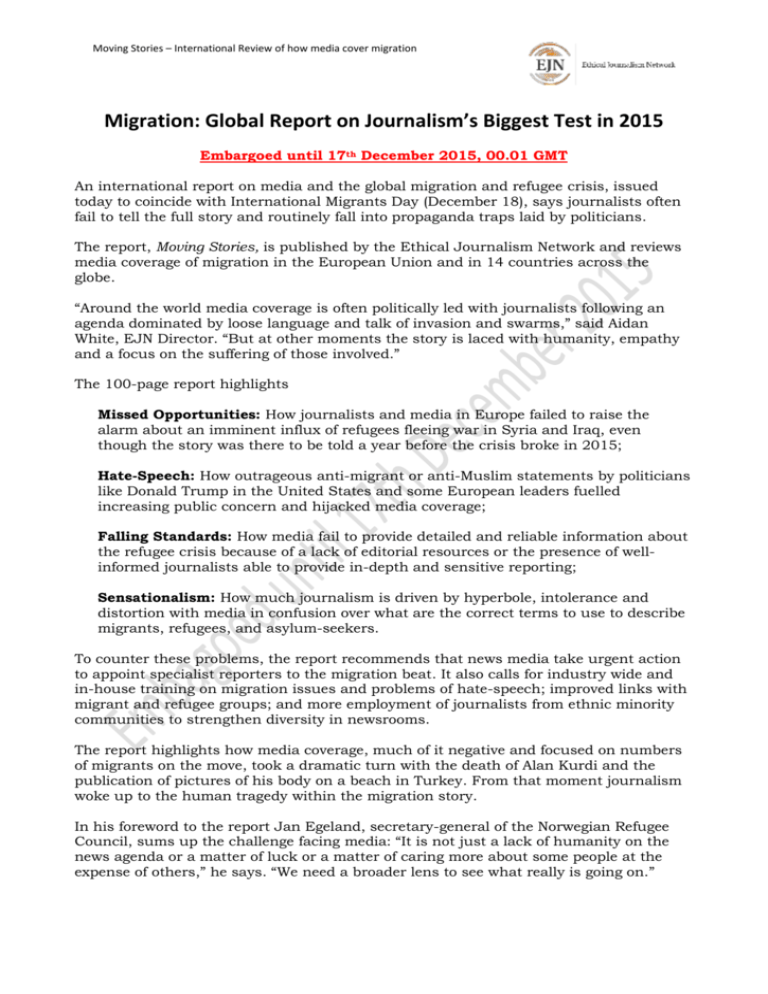
Moving Stories – International Review of how media cover migration Migration: Global Report on Journalism’s Biggest Test in 2015 Embargoed until 17th December 2015, 00.01 GMT An international report on media and the global migration and refugee crisis, issued today to coincide with International Migrants Day (December 18), says journalists often fail to tell the full story and routinely fall into propaganda traps laid by politicians. The report, Moving Stories, is published by the Ethical Journalism Network and reviews media coverage of migration in the European Union and in 14 countries across the globe. “Around the world media coverage is often politically led with journalists following an agenda dominated by loose language and talk of invasion and swarms,” said Aidan White, EJN Director. “But at other moments the story is laced with humanity, empathy and a focus on the suffering of those involved.” The 100-page report highlights Missed Opportunities: How journalists and media in Europe failed to raise the alarm about an imminent influx of refugees fleeing war in Syria and Iraq, even though the story was there to be told a year before the crisis broke in 2015; Hate-Speech: How outrageous anti-migrant or anti-Muslim statements by politicians like Donald Trump in the United States and some European leaders fuelled increasing public concern and hijacked media coverage; Falling Standards: How media fail to provide detailed and reliable information about the refugee crisis because of a lack of editorial resources or the presence of wellinformed journalists able to provide in-depth and sensitive reporting; Sensationalism: How much journalism is driven by hyperbole, intolerance and distortion with media in confusion over what are the correct terms to use to describe migrants, refugees, and asylum-seekers. To counter these problems, the report recommends that news media take urgent action to appoint specialist reporters to the migration beat. It also calls for industry wide and in-house training on migration issues and problems of hate-speech; improved links with migrant and refugee groups; and more employment of journalists from ethnic minority communities to strengthen diversity in newsrooms. The report highlights how media coverage, much of it negative and focused on numbers of migrants on the move, took a dramatic turn with the death of Alan Kurdi and the publication of pictures of his body on a beach in Turkey. From that moment journalism woke up to the human tragedy within the migration story. In his foreword to the report Jan Egeland, secretary-general of the Norwegian Refugee Council, sums up the challenge facing media: “It is not just a lack of humanity on the news agenda or a matter of luck or a matter of caring more about some people at the expense of others,” he says. “We need a broader lens to see what really is going on.” Moving Stories – International Review of how media cover migration The lack of a wider perspective often leads media to miss the link between migration and human development. Journalists often ignore the evidence of serious studies that illustrate how migration, despite short-term challenges, is invariably beneficial for economic and cultural development in the longer-term. The reports states: “There is a tendency, both among many politicians and in sections of the mainstream media, to lump migrants together and present them as a seemingly endless tide of people who will steal jobs, become a burden on the state and ultimately threaten the native way of life. Such reporting is not only wrong; it is also dishonest. Migrants often bring enormous benefits to their adopted countries.” The report examines media coverage in a diverse range of countries. From Australia, a country built by migrants, where media struggle to apply well-meaning codes of journalistic practice within a toxic political climate to Nepal and the Gambia which are exporters of labour. In these countries censorship or a lack of resources - or a combination of both - are mainly to blame for poor coverage. The reports on migration in China, India and Brazil tell another story. Though large numbers of people migrate from each of these countries, the main focus is on internal migration, a global phenomenon often ignored by mainstream media that involves millions and dwarfs international migration numbers. The biggest movement of people in history has taken place in China over the last 35 years. In Africa while headlines focus on people leaving the continent and heading north, there is also migration between countries, with many people from the impoverished central regions heading for South Africa – a country where media also deal with problems of xenophobia and governmental pressure. In Europe, where migration and refugee issues have shaken the tree of European unity, media struggle to provide balanced coverage when political leaders respond with a mix of bigotry and panic – some announcing they will only take in Christian migrants while others plan to establish walls and razor wire fences. The report looks at Bulgaria where media have allowed sensationalism to dominate migration reporting and Italy, where hate-speech is counterbalanced by a purpose-built ethical charter for media. In Britain the report notes how the story is often told without a sense of scale or balance with extensive reporting on the plight of people at a small refugee camp in Calais. In Turkey, seen by many European politicians as a key country in stemming the onward rush of migrants, most media are under the thumb of a government that punishes dissident journalists, so public debate is limited. In Lebanon where millions of refugees from war-torn Syria are based the story is not helped by confused mixing of fact and opinion by many media. In the United States the controversial Republican Presidential candidate Donald Trump has made migration an explosive topic. Media time has focused on heated and often racist exchanges which obscures some fine journalism that provides much-needed context. South of the border, media in Mexico suffer from undue political pressure and self-censorship. “The refugee crisis is not going to go away,” says White “and there has never been a greater need for useful and reliable intelligence on the complexities of migration. But if that is to happen, as this report shows, we must strengthen the craft of journalism.” -- ENDS – Moving Stories – International Review of how media cover migration The full embargoed report can be accessed at this private link: Moving Stories – International Review of How Media Cover Migration The report will be published at 00.01 GMT on 17 December 2015. Please do not share this link or the contents of the report or press release in advance. For further information contact: Tom Law – EJN Communications Officer tlaw@ethicaljournalismnetwork.org @TomLawMedia +44(0)7594270633 Aidan White – EJN Director aidanpatrickwhite@gmail.com @aidanpwhite For the full list of authors who may be available for interview see the following page. About the Ethical Journalism Network The Ethical Journalism Network is an unprecedented effort to promote an ethical renaissance based on transparency, self-regulation and good governance. The Ethical Journalism Network promotes ethics, good governance and independent regulation of media content. The EJN was formed in 2011 as a unifying professional campaign bringing together owners, editors and media staff to strengthen the craft of journalism. It works across all platforms and supports partnership at national and international level between media, journalism support groups and the public. Website: www.ethicaljournalismnetwork.org Social media: @EJNetwork -- Facebook -- LinkedIn -- Flickr -- Youtube For this report we will be using the hashtag #movingstories Previous EJN reports For more on the work of the Ethical Journalism Network you can read all of our previous reports on our Scribd account. These include: - Untold Stories: How Corruption and Conflicts of Interest Stalk the Newsroom The Trust Factor: An EJN Review of Journalism and Self-Regulation Turning the Page of Hate in Media Moving Stories – International Review of how media cover migration Contributors who may be available for interview. The View from Brussels: Missed opportunities to call the European Union to account Tony Bunyan is an investigative journalist and writer. Tony specialises in justice and home affairs, civil liberties, the state and freedom of information in the EU and has been the Director of Statewatch since 1991. The newspaper “European Voice” selected him as one of the “EV50” – one of the fifty most influential people in the European Union and he has also been given a Liberty Human Rights Award. Bulgaria - A study in media Sensationalism. Rossen Bossev is journalist at Capital Weekly in Sofia, Bulgaria. He writes on judiciary, law enforcement and human rights issues. He was twice awarded at the International Right to Know Day for his use of the freedom of information act in his investigations. Maria Cheresehva is a communications expert and freelance journalist. She works voluntarily for providing humanitarian and integration support to refugees and migrants, she is a campaigner for human rights. She has been an editor in ENTERPRISE, Infostock and Evropa. Italy - A charter for tolerant journalism: Media take centre stage in the Mediterranean drama. Yasha Maccanico has been a researcher, reporting on civil liberties developments in southwestern Europe for Statewatch since 1998. He is currently a PhD candidate in Policy Studies at the University of Bristol. Turkey - Media under the government’s thumb and migrants in a legislative limbo. Elif Ince (writer) is an Istanbul based journalist whose reporting on urban and environmental issues has received various awards. A graduate of Brown and Columbia University School of Journalism, she is the co-founder of Networks of Dispossession (mulksuzlestirme.org) – a collective data mapping project dedicated to investigate the relations between capital and power in Turkey. United Kingdom - How journalism plays follow-my-leader in the rhetoric of negativity. Zak Suffee is a Researcher at Statewatch on Justice and Home Affairs. She is also currently undertaking a doctorate degree in Race and Migration at Kings College London. She has worked extensively in communications and media as well as migration and policy. Australia - In a nation of migrants the media faces its own identity crisis. Christopher Warren is an Australian journalist whose family migrated to Australia between 1820 and 1910. He is currently affiliated with the JSK journalism program at Stanford University. He is the former Federal Secretary of the Media, Entertainment & Arts Alliance (Australia) and immediate past President of the International Federation of Journalists. President of the International Federation of Journalists. Brazil - Where politics takes precedence over the people who make it. Jan Rocha, based in Sao Paolo, is a former correspondent for the Guardian and the BBC World Service. She has lived in Brazil for many years and has written several books about the country. Jan has an intimate knowledge of Brazil having travelled extensively around the country. She is particularly involved in labour and environmental matters and has monitored the movement of workers and the continued expansion of settlements in the Amazonian region. China - An inside story: China’s invisible and ignored migrant workforce. Violet Law is a Hong Kong based journalist who has written for the Los Angeles Times and other US newspapers Fluent in both Mandarin and English, Violet has reported widely on political, social and economic affairs in China. She reported in detail on the recent protests in Hong Kong concerning Beijing’s influence on affairs in the territory and closely monitors demographic changes in both China and Hong Kong. West Africa: The Gambia - Desperate young take the backway to an uncertain future. Lamin Jaiteh has been a journalist and broadcaster for 17 years. He worked for Gambia Moving Stories – International Review of how media cover migration Radio and TV Services from 1998-2006. He is now a freelance journalist, based in London, UK. He also produces a weekly TV programme-(InterfaceGambia TV) on BEN Television on SKY channel 182. India - How missing facts and context is toxic for media coverage. Pramila Krishnan, based in Chennai, Southern India, hosts a weekly show on TV News 7 Tamil that focuses on social issues. She also works on film documentaries and on current affairs news stories. Primila has contributed to a number of newspapers and magazines in the southern India region, mainly writing on social and environmental issues. She is a regular contributor to Climate News Network, a web based news agency. www.climatenewsnetwork. Lebanon - Lebanon’s media put humanity in the mix as the refugee crisis takes hold. Magda Abu-Fadil is Media Unlimited director and consultant veteran foreign correspondent/editor who worked with Agence France-Presse, United Press International, Asharq Al-Awsat, Al Riyadh, Defense News, Events and The Middle East. She founded the Journalism Training Program at the American University of Beirut. She blogs for the Huffington Post. Mexico - Shallow journalism in a land where political bias rules the newsroom. Elva Narcia is a media development specialist with professional work experience in Norway, Spain, UK, Mexico, Ethiopia, Afghanistan, Pakistan and South Sudan. She is the founder and director general of Glifos Comunicaciones, the first media for development communications agency in Latin America. For 15 years previously was an award winner Senior Journalist with the BBC World Service. Nepal - Information gaps fail to keep track of a country on the move. Om Astha Rai writes mainly for the Kathmandu based Nepali Times. He covers current affairs, the environment, climate change and migration: he recently won a national prize for a story on the mental problems suffered by returning Nepali migrant workers. South Africa - Compelling tales of afrophobia and media selective blindness. Anton Harber is the Caxton Professor of Journalism at the University of the Witwatersrand, Johannesburg. He was founder-editor of the anti-apartheid newspaper the Weekly Mail (now the Mail & Guardian). He is chair of the Freedom of Expression Institute, board member of the Global Investigative Journalism Network, and writes a column in Business Day. He is the author of Diepsloot (Jonathan Ball, 2011). United States - The Trump Card: How US news media dealt with a migrant hate manifesto. Bill Orme is a strategic communications advisor and former journalist, who has covered immigration issues as a correspondent in Mexico for The Washington Post and The Economist and in the Middle East for The New York Times. He was executive director of the Committee to Protect Journalists (CPJ) in the 1990s and over the past decade as external communications chief for the United Nations Development Programme (UNDP). He is currently the UN Representative of the Brussels-based Global Forum for Media Development (GFMD).



